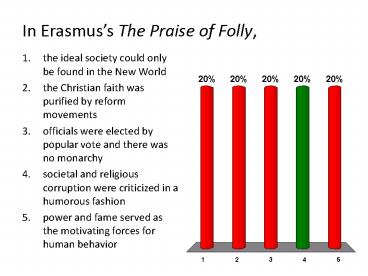In Erasmus - PowerPoint PPT Presentation
1 / 15
Title:
In Erasmus
Description:
... admired the peasants for challenging unjust rule condemned the violent response of the German princes called on German lords to ... Supper in the evening in ... – PowerPoint PPT presentation
Number of Views:58
Avg rating:3.0/5.0
Title: In Erasmus
1
In Erasmuss The Praise of Folly,
- the ideal society could only be found in the New
World - the Christian faith was purified by reform
movements - officials were elected by popular vote and there
was no monarchy - societal and religious corruption were criticized
in a humorous fashion - power and fame served as the motivating forces
for human behavior
2
Indulgences were
- mentioned prominently in the Bible
- used by both Protestant and Catholic priests
- a necessary prerequisite for justification of
faith - offered by the Lutherans
- addressed in the Ninety-Five Theses
3
The Protestant Reformation is built upon the
foundation of
- good works and priestly authority
- justification by faith and biblical authority
- salvation by works and papal authority
- regular confession of sin
- the authority of the church
4
In the Peasants War of the mid-1520s, Martin
Luther
- supported the peasants in their uprising against
their lords - ignored the revolts in hopes that they would soon
go away - admired the peasants for challenging unjust rule
- condemned the violent response of the German
princes - called on German lords to restore order by any
means
5
The Peace of Augsburg in 1555 guaranteed the
right of
- each German ruler to determine the faith of his
subjects - each German citizen to choose between either
Catholicism or Lutheranism - the Catholic Church to complete religious
hegemony in Italy - the Lutheran Church to complete religious
hegemony in Germany - religious freedom for all German citizens
6
The Anabaptists of the sixteenth century
- believed in the authority of each congregations
church elders to make all decisions - appealed to the state for protection against
radical fringe groups - celebrated the Lords Supper in the evening in
private homes - sought public office so as to forward righteous
political causes - promoted reforms that appealed to Protestant and
Catholic authorities
7
The theology of John Calvin emphasized all of the
following except the
- Lutheran doctrine of justification by faith alone
- complete and absolute sovereignty of God
- spiritual presence of Jesus in the Last Supper
- helplessness of man to circumvent the laws of
predestination - importance of accumulating wealth to prove ones
virtue
8
Henry VIII
- maintained a strong friendship with Thomas More
- refused to recognize the supremacy of the pope
- abolished the Church of England
- always wanted his daughter Elizabeth to rule
England - never sought legislation from Parliament to
legitimize his actions
9
The final decrees of the Council of Trent
- approved a Protestant doctrine of justification
- made compromises with Protestants virtually
impossible - called for the establishment of Catholic
seminaries in all Protestant lands - let Catholics decide individually whether to
accept transubstantiation - allowed the Lutheran church to reconcile with the
Catholic church
10
Transubstantiation
- is Catholic doctrine that taught the bread and
wine miraculously changed into the Eucharist,
which is the body and blood of Jesus - was the Catholic version of justification by
faith - was Lutheranisms separation from the Catholic
church - maintained the variances of church doctrine
between the Anabaptists and other Protestant
groups - was the act of excommunication from the Lutheran
church of those who maintained Catholic tradition
11
The French Wars of Religion were prompted by all
of the following except
- fear among the monarchies of the growth of
Calvinism - a desire among towns and provinces to gain more
power - a desire to bring about religious harmony among
Catholics and Huguenots - a desire to maintain Catholic religious dominance
within France - fear among the monarchies of the appeal of
Calvinism to the French nobility
12
Among the earliest and most consistent goals of
Spains King Philip II was a
- firm determination to keep all his subjects
Catholic - commitment to allow more local authority in the
various parts of his empire - search for a body of competent advisors to
supervise his overseas possessions - wish to marry Elizabeth of England and
consolidate his kingdom with her kingdom - desire to spread religious toleration throughout
all of his possessions
13
_____ tried to ensure England would remain a
Catholic country.
- Mary, the daughter of Henry VIII
- Elizabeth, the daughter of Henry VIII
- Ulrich Zwingli
- Thomas Cranmer
- Thomas Cromwell
14
Elizabeth pursued religious policies that sought
to
- affirm the goal of Edward VI to make the English
Church Protestant - ban any of Edwards or Marys children from
inheriting the throne - antagonize Catholics and radical Protestants
- acknowledge the son of Mary Queen of Scotland as
Elizabeths heir - ensure long-term political and religious stability
15
During the reign of Elizabeth, the Puritan
movement involved
- Catholics who wanted to cleanse the Anglican
Church - Anabaptists who wanted to reform the Church of
England - Protestants who wanted to establish a new church
- Protestants who wanted to cleanse the Anglican
Church - reformers who wanted to remove the queen






























![❤[READ]❤ Religion and the Rise of Modern Culture (ND Erasmus Institute Books) PowerPoint PPT Presentation](https://s3.amazonaws.com/images.powershow.com/10051088.th0.jpg?_=20240608101)
